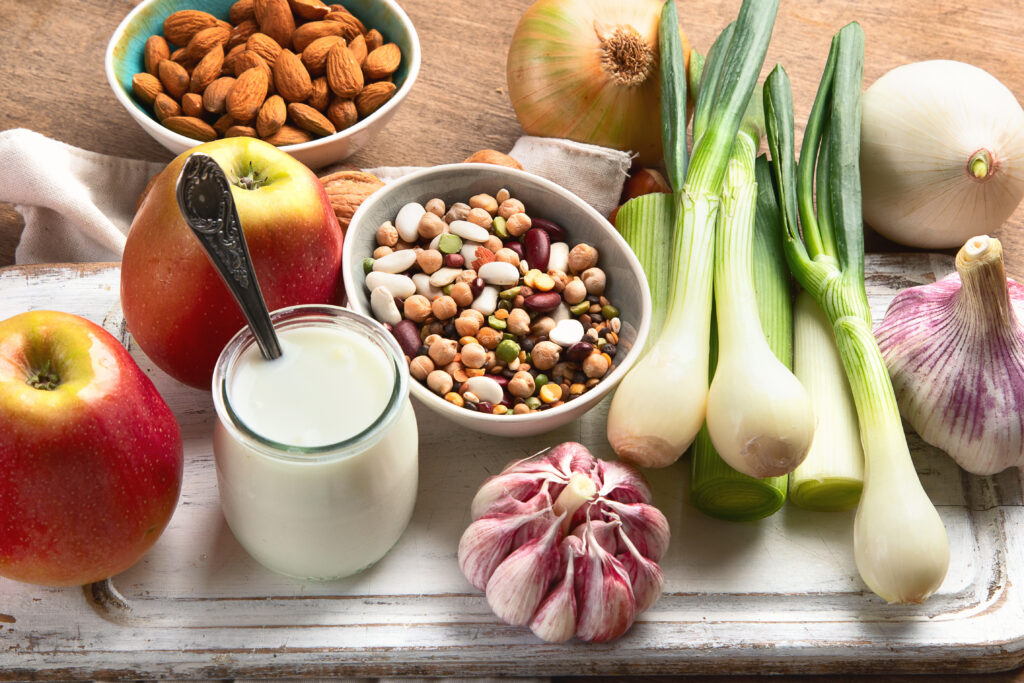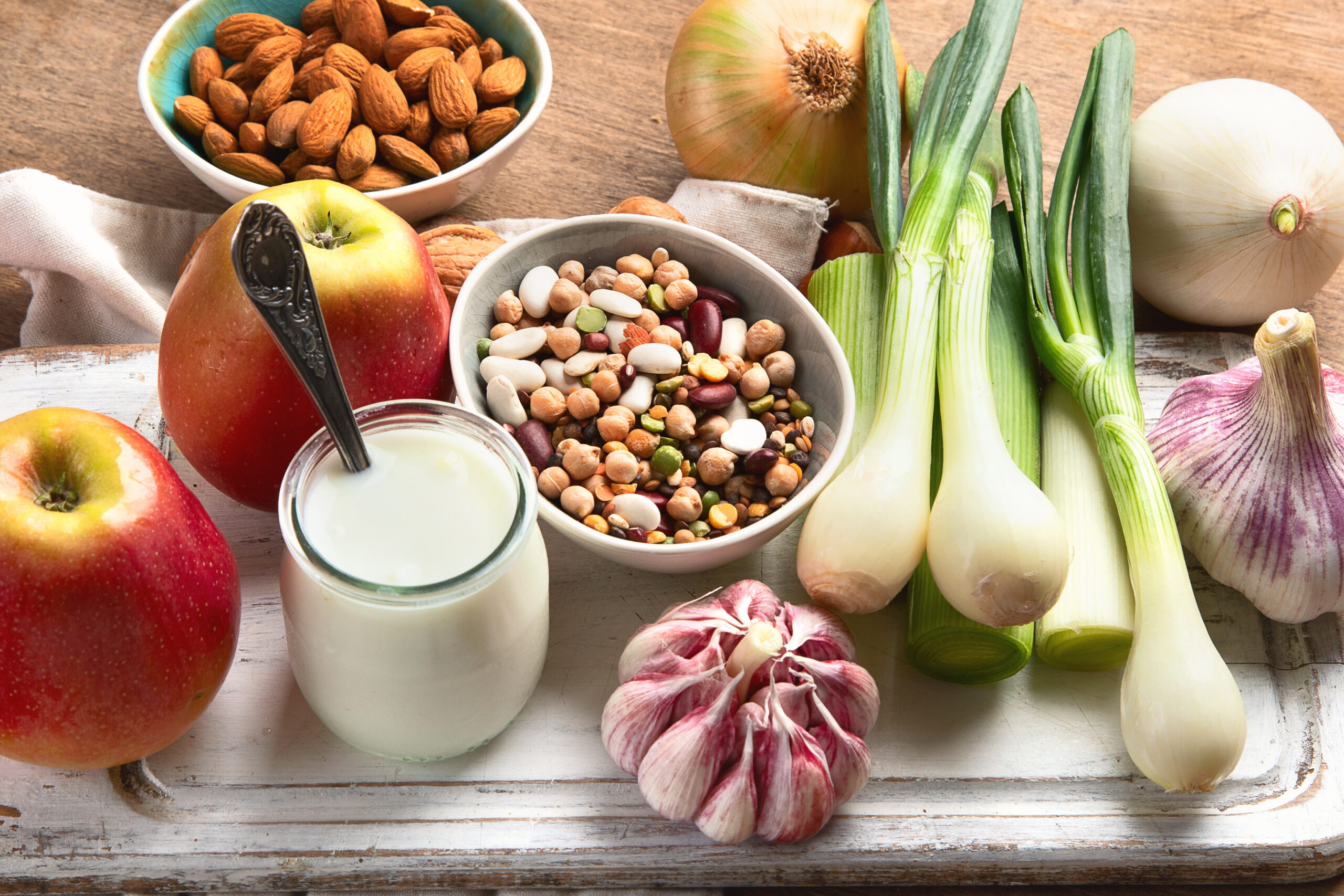Probiotics are popular in both supplements and functional foods. While most people associate probiotics with digestive health, the health of your gut is connected to whole body wellness. A healthy intestinal environment influences heart health, brain health, and immune system function.
If you’re looking for easy lifestyle and diet changes to support heart health, you may be wondering if you should be taking probiotics. In this article, we’ll review what the evidence shows for taking probiotics for heart health and how to choose the best source of probiotics for your needs.
What are Probiotics?
Probiotics are live microorganisms, including different types of bacteria and yeast, that are beneficial to your body. Probiotics are added to supplements and some foods to support a healthy bacterial population in your digestive system, which is known as the gut microbiome.
The microorganisms in your gut microbiome have many functions, including:
- Helping to digest food
- Synthesizing some vitamins
- Maintaining the structural integrity of the intestinal lining
- Keeping bad bacteria from crossing the intestinal barrier and making you ill
You may also have heard of prebiotics, which are related to but not the same as probiotics. Prebiotics are not microorganisms; they’re a food source for your gut microbiome. Remember your gut contains living organisms and they need to be fed to survive and thrive. Prebiotics are a type of dietary fiber and can be found in foods such as apples, artichokes, bananas, garlic, onions, and whole grains.
Both probiotics and prebiotics can support a balanced gut microbiome, improve digestion and regularity, and influence heart health.

The Gut-Heart Connection
How does digestive health relate to heart health? Researchers have found your gut is tied to the health of other body parts, including the central nervous system and cardiovascular system. The relationship between your digestive system and your cardiovascular system is known as the gut-heart axis.
Researchers are studying the gut microbiomes of individuals with cardiovascular disease (CVD) to determine the role microorganisms may play in the development and management of heart conditions. Bacterial imbalances in the digestive system have been linked to higher levels of inflammation and decreased immune system function, both of which are risk factors for developing heart disease.
Your gut microbiome also produces metabolites after digesting the food you eat. Your diet determines which metabolites, and how many of them, are made. Studies have linked higher levels of certain metabolites to the development of CVD.
Probiotics for Heart Health
If the balance of your gut microbiome influences the risk of heart disease, it stands to reason that probiotics may benefit heart health. Here’s what we know.
Researchers have found evidence that probiotics can help decrease inflammation and oxidative stress, which are drivers of heart disease. Probiotics possess antioxidant properties of their own, as well as produce some antioxidants and decrease the production of damaging free radicals that trigger inflammation and disease.
Multiple studies have observed improvements in blood pressure, triglycerides, total cholesterol, and LDL cholesterol following probiotic supplementation. High blood pressure and elevated lipids are risk factors for CVD. There’s also evidence probiotics can support weight management and improve blood sugar control. Maintaining a healthy weight and keeping blood sugar stable can support heart health and decrease your risk of heart problems.
Many probiotic strains are being studied for how they may impact heart health. Probiotics associated with lowered cholesterol include strains belonging to the Bifidobacteria family, as well as certain strains of Lactobacillus plantarum and Lactobacillus acidophilus. Lactobacillus rhamnosus GG is a probiotic strain found in most yogurts that has been linked to reductions in high-sensitivity C-reactive protein, a biomarker used to assess systemic inflammation.
There’s also evidence that prebiotic supplementation can support healthier levels of triglycerides, total cholesterol, LDL cholesterol, and inflammatory markers, such as high-sensitivity C-reactive protein.
But, when it comes to pre-and probiotics, cardiologists are warning they aren’t a treatment for elevated blood pressure, cholesterol, or other heart health markers. The health benefits of probiotics are also strain-specific, so taking any probiotic off the shelf won’t guarantee results.
Probiotics can support a healthy cardiovascular system, but they’re only one piece of the puzzle. Diet, physical activity, stress management, and/or medication also play important roles in keeping your heart and blood vessels in good shape.
Sources of Probiotics
Adding probiotics to your routine can help balance your gut microbiome, but what’s the best source of probiotics?
Some foods that are produced through fermentation are a natural source of probiotics. They include yogurt, kefir, and fermented vegetables, all of which can be found in the refrigerated section of your grocery store.
Yogurt and kefir are nutritious choices for a heart healthy diet. Besides probiotics, yogurt, and kefir are both good sources of protein, magnesium and calcium. Researchers have linked regular yogurt consumption, defined as eating two or more servings of yogurt per week, to a decreased risk of developing CVD. Choose plain, unsweetened yogurts and kefir to limit the intake of added sugars.
Probiotic foods should not be heated or used in cooked recipes, since heat kills off the beneficial probiotic bacteria. Although probiotic-containing foods can be nutritious choices, they may not contain all of the probiotic strains you need.
A probiotic supplement can help balance the types of bacteria in your gut and introduce bacterial strains you may be lacking. Probiotics are available in several forms, including capsules, powders, and liquids. The supplement facts label will inform you what strains a probiotic contains and how many colony forming units (CFUs) are in each serving of a probiotic.
Eating a nutritious diet also helps maintain intestinal bacteria. Foods with fiber, such as vegetables, beans, and whole grains, provide prebiotics, which are essentially food for probiotics.
An RD can help match you with a probiotic that contains strains that will benefit your health needs and make diet recommendations to support both the gut microbiome and heart health.
Takeaway
Probiotics do more than simply support digestion and bowel movements. Probiotics also support heart health through a complex, synergistic relationship known as the gut-heart connection. Including daily probiotic sources can help maintain your gut microbiome and may enhance your efforts to improve cardiac markers, like blood pressure and cholesterol levels.
Should you get probiotics from food or supplements? The answer is, it depends on your specific situation. A healthy, fiber-rich diet is also essential for maintaining your gut microbiome and supporting heart health. A cardiac dietitian can advise you if probiotics may help improve your cardiac lab values and the best probiotic sources for your needs.
If you’re looking for 1 on 1 support via a personalized, science based approach to optimize your heart health, schedule a 15-minute complimentary discovery call today.
References
- Trøseid M, Andersen GØ, Broch K, Hov JR. The gut microbiome in coronary artery disease and heart failure: Current knowledge and future directions. EBioMedicine. 2020;52:102649. doi:10.1016/j.ebiom.2020.102649
- Oniszczuk A, Oniszczuk T, Gancarz M, Szymańska J. Role of Gut Microbiota, Probiotics and Prebiotics in the Cardiovascular Diseases. Molecules. 2021;26(4):1172. Published 2021 Feb 22. doi:10.3390/molecules26041172
- Wu H, Chiou J. Potential Benefits of Probiotics and Prebiotics for Coronary Heart Disease and Stroke. Nutrients. 2021;13(8):2878. Published 2021 Aug 21. doi:10.3390/nu13082878
- Dixon A, Robertson K, Yung A, et al. Efficacy of Probiotics in Patients of Cardiovascular Disease Risk: a Systematic Review and Meta-analysis. Curr Hypertens Rep. 2020;22(9):74. Published 2020 Aug 29. doi:10.1007/s11906-020-01080-y
- Buendia JR, Li Y, Hu FB, et al. Regular Yogurt Intake and Risk of Cardiovascular Disease Among Hypertensive Adults. Am J Hypertens. 2018;31(5):557-565. doi:10.1093/ajh/hpx220
